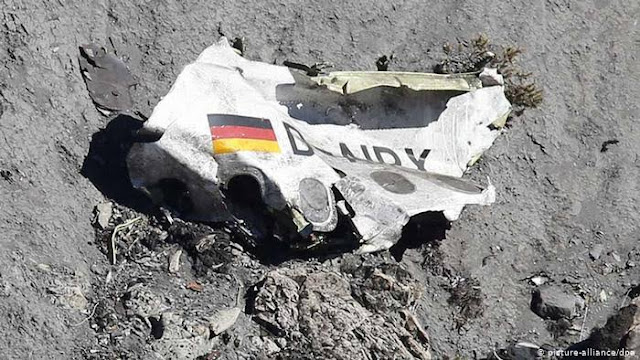Fascinating Horror - On the 24th of March 2015at around 10:41amGermanwings flight 9525 crashed in theFrench Alps resulting in the death ofevery single person on board.
Aninvestigation revealed that the crashwas caused deliberatel, but not bysabotage or a terrorist attack.
In thecase of the Germanwings disaster thecrash was caused by the co-pilot AndreasLubitz, who purposefully and calculatedlyflew the plane into the side of amountain.
Germanwings was a popular low-costcarrier owned by Lufthansa whichoperated multiple routes within Europe.
Germanwings flight 9525 took off fromrunway 07R at Barcelona El Prat Airportat 10:01am local time, approximatelyhalf an hour late.
It was bound forDüsseldorf Airport where it wasscheduled to touch down at 11:39amlocal time.
On board were 144 passengers,two pilots, and four members of cabincrew who altogether represented morethan 18 different countries ranging fromJapan to the Netherlands.
After anuneventful takeoff the pilots on boardconfirmed instructions from Air TrafficControl at 10:30am.
At 10:31am theaircraft left its assigned cruisingaltitude of 11,600 meters (or 38,000foot) and without approval began todescend rapidly.
Air traffic controllersswiftly declared that the aircraft wasin distress after finding themselvesunable to contact it.
The plane's descentlasted just 10 minutes.
During this timea French military Mirage jet wasscrambled from the Orange-Caritat airbase to intercept the aircraft.
Before itcould do so, however, the aircraft haddescended to 1880 metres (or 6,175foot) and subsequently crashed in aremote part of the Alps northwest ofNice killing everybody on board.
At thetime it was unknown what exactly hadhappened on board, but a subsequentinvestigation revealed the entirechilling narrative.
The flight's pilot incommand was 34 year-old captain PatrickSondenheimer, with 27-year-old AndreasLubitz as co-pilot.
Cockpit voicerecordings revealed that Lubitz wasinitially polite to Captain Sondenheimerduring takeoff but became somewhatshort-tempered when the captain beganthe mid-flight briefing on the plannedlanding.
When the captain stepped out ofthe cockpit to use the toilet Lubitzlocked the cockpit door and thendisabled the lock.
Captain Sondenheimerrequested re-entry using the intercom.
Heknocked on the door with increasingurgency but received no response.
Attempts were made by the captain andthe cabin crew to break down the door,but like all cockpit doors in theaftermath of the 9/11 terrorist attacksit had been reinforced to preventintrusion.
As Lubitz steered the planesteadily towards the ground the cockpitvoice recorder captured the franticattempts to break down the door, constantcalls from Air Traffic Control, andLubitz's own steady breathing.
He madeno other sound.
He did not speak a word.
In the final moments before impact thevoice recorder captured only the finalscreams of the passengers as theyrealized what was about to happen.
While the facts of the matter were clearenough one question remained: why? Why hadLubitz done this? A search of his homeand a thorough psychological profileprovided some answers.
Lubitz hadrecently been declared unfit for work bya doctor but had not revealed thisinformation to his employer.
He was alsotaking prescription medication which hehad not disclosed to his employer andsuffering from a psychosomatic illness -that is an illness which manifests witha range of symptoms but which cannot betraced to any particular cause.
InLubitz's case the main symptom was apowerful and unfounded fear that he wasgoing blind.
Lubitz consulted more than 40 doctorsabout this but none were able to uncovera problem with his vision or a reasonfor his extreme fear of the same.
Terrified that his encroaching blindnesswould cost him his pilot's licenseLubitz became suicidal.
The investigationdetermined that his situation wasworsened by the fact that there was nospecific insurance for pilots coveringthe risks of loss of income in case ofunfitness to fly.
To be declared unfit tofly would have ruined him financially.
Worse still, at the time, there was a lackof clear guidance in Germany as to whena pilot had to disclose a medicalcondition and when a pilot'sconfidentiality should be respected.
Thismeant there was little pressure forLubitz to disclose his medical issuesand no way for his employer to find outabout them unless he did disclose them.
Lubitz, it emerged, had run searches on atablet computer for "ways to commitsuicide" and "the security of cockpitcabin doors".
Chillingly he had also practiced thesequence of commands he would use tocrash the plane whilst alone in thecockpit on the outbound flight he hadworked just before Germanwings 9525.
Lubitz was thoroughly prepared.
Once he beganhis suicide attemptnothing could sway him from his plan, andnothing could save the 149 people hetook with him to the grave.
In theimmediate aftermath the parent airlineof Germanwings, Lufthansa, canceled anumber of flights solely because so manyof their pilots were grief-stricken ortoo distressed to fly.
They retired theflight number 9525 permanently and brought into forceregulations to require that two pilotswere present in the cockpit at all timesduring all flights.
Many other countriesbrought in similar legislation to echothis.
While these changes make an exactrepeat of the Germanwings crash unlikely,the incident nonetheless made many peoplepainfully aware of how precarious flightcan be.
On board a plane the lives ofhundreds are placed in the hands of justone or two individuals - strangers, atleast as far as the passengers areconcerned, but strangers who weimplicitly trust...
never knowing whatmight really be happening inside theirheads.







Post a Comment
Post a Comment